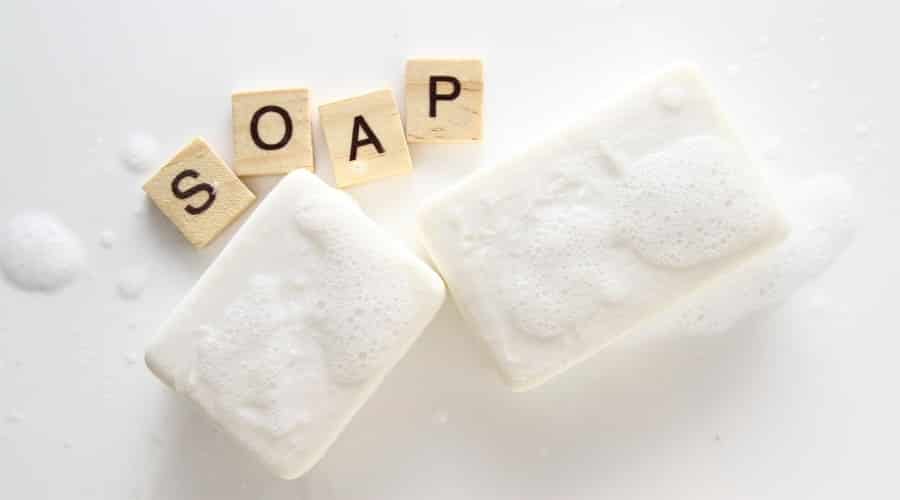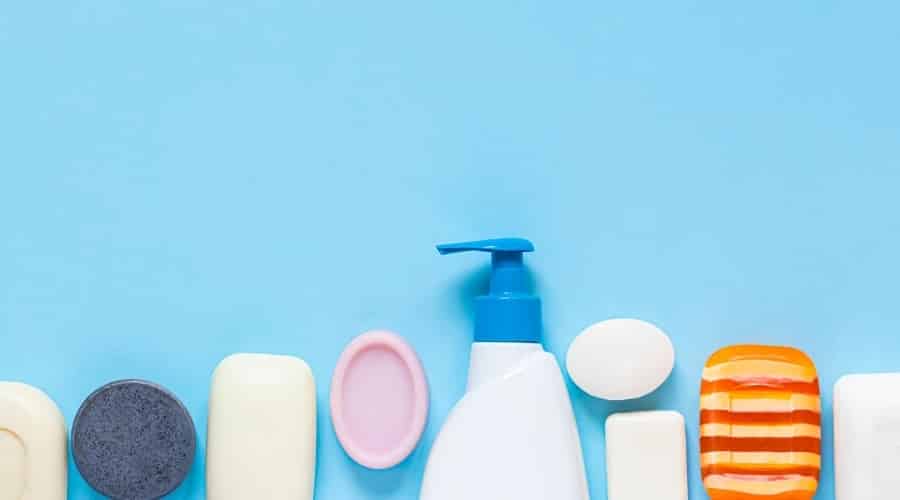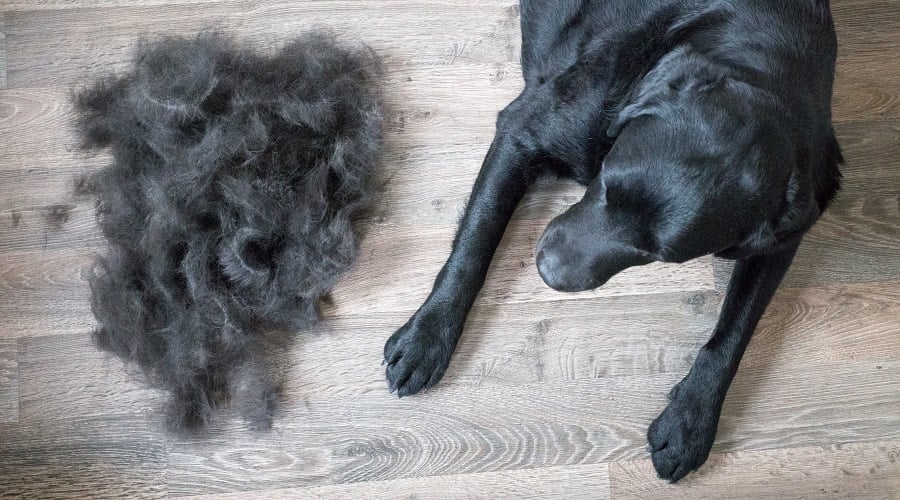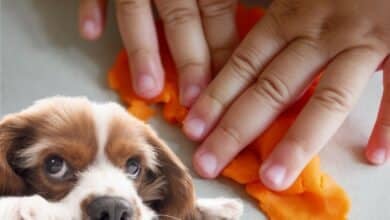My Dog Ate Bar Or Liquid Soap! What Should I Do Next?
When you purchase through links on our site, we may earn a commission. Here’s how it works.
So, your dog just ate soap. You are probably asking yourself, “Why on earth would a dog want to eat soap? Will they be ok? What should I do?” This is going to depend on what type of soap it was. Dishwasher soap is different from facial soap, and bar soap is different from liquid soap. In my experience, most dogs who eat soap will be fine, as only a very small amount has been eaten. However, calling a vet to be sure – and taking some of the steps we outline below – are sensible precautions.
Table of Contents
Before you read further, please know that, firstly, we recommend a phone call to your vet. In most cases, it’s free, and your vet or vet tech can give you peace of mind, oftentimes without an in-person visit. You can also call the ASPCA hotline at no cost. The good news is that most of the time, a dog that eats a little bit of hand soap, dish soap, or body soap will be just fine. While we go into the steps you’ll want to take in detail, we do recommend you contact your own vet immediately or your local animal poison control hotline.
So when your dog eats soap, you may be alarmed. Depending on the type of soap it is, there are some steps you can immediately take. In the guide below, we walk through exactly what you should do if your favorite furry friend decides to eat a bar that has a little more suds than their favorite dog food.
Types Of Soap Matter

There are many varieties of soap used in our households. These include those used for washing our bodies (e.g., hands and face) as well as detergents for washing our clothes and dishes. They come in a variety of forms ranging from solid bars, powders, and liquids. They may be unpackaged or contained in dispensers, capsules, or ‘tablets.’
Most times, when a dog eats some hand or dish soap, it’s not something you’ll need to be incredibly concerned about. The most common types of soap that a dog will ingest are a basic bar of hand soap or they decide to get into dish soap. Both of these are fairly common, and the steps for treatment are straightforward. If your pup decided to get into a soap that’s made for acne treatment, a detergent pod, or a large quantity of any type of soap, then treatment will vary depending on the ingredients.
Sometimes you can do absolutely everything to keep your dog safe. Somehow, they still manage to lick some liquid soap or even eat a whole bar. It can happen so quickly, and the only evidence you may have is a missing bar of soap or a chewed soap dispenser. If this does happen, try not to worry. We’ll explain why dogs are attracted to soap, whether soap is poisonous to dogs, and what to do if your dog eats soap.
Why Dogs Eat Soap

Certain dogs will be more curious than others. It largely depends on their age and personality. Puppies that are teething are more likely to chew or eat inedible items. Chewing on something helps soothe their discomfort. When your puppy is going through the chewing phase, you should ensure likely chew items are kept out of reach. Providing your pup with a suitable puppy chew toy (or several) will often resolve this problem.
We like to smell nice, so perfumes are often added to soaps. These pleasant aromas may also be attractive to your dog as well. This encourages them to lick, chew, or even ingest large volumes of soap. This may simply happen because your dog mistakes it for a toy. Or, soap may have leaked onto the floor, and your dog comes along to ‘clean up’ the spillage. They may be tempted by those gorgeous soapy bubbles while you have a bath. They may even just be licking you when you get out of the shower or bath.
Some dogs are just plain greedy and will always be on the lookout for their next snack. This can happen regardless of what this is. Determined dogs can be quite a challenge. Sometimes there could be a medical or behavioral reason for your dog chewing or eating inedible items. If this is a frequent occurrence, we recommend having a check-up with your vet to discuss this possibility.
Pica
Dogs that are repeatedly attracted to soap or other inedible items may require further investigation. Pica is a condition where pets feel the need to eat unusual items such as wood, grass, plastic, paper, or metal. It may be one particular item that they crave, or they may seek out different items. Pica is caused by an underlying behavioral or medical condition. Your vet may want to run blood tests or suggest a behavioral assessment.
Is Soap Poisonous To Dogs?

Some of the ingredients in soap can be poisonous to dogs. Every soap is different and can have variable ingredients and strengths of toxic components. Therefore, there is no defined safe amount that can be ingested by your pet. Solid bars of soap are made from sodium hydroxide (otherwise known as caustic soda and often referred to as ‘lye’).
Liquid soaps are produced from potassium hydroxide. Both hydroxides are strong alkalis and can cause chemical burns to the mouth, esophagus (food pipe), and stomach if ingested. Symptoms may include drooling, vomiting, tummy pain, and diarrhea.
Dishwasher or laundry detergent in a capsule is considered more dangerous, as they ‘burst’ when chewed, firing the chemicals to the back of the mouth and throat and even into the lungs. Detergent or soap pods that are ingested definitely warrant an immediate call and/or trip to your vet. Some soap pods contain some of the same toxic chemicals that dryer sheets do.
Perfumes & Oils in Different Soaps
Essential oils such as pine oil are often added to soaps and can also cause problems for your pet if eaten. Ingesting pine oil can cause weakness, collapse, and liver and/or kidney damage. Burns or ulcers to the mouth may cause discomfort, which your pet may display by pawing at the mouth or excessive licking. It’s important to know what’s in the soap your dog ate before you make an emergency trip to the ER vet.
Other Dangers Of Eating Soap
When I was first working in a veterinary clinic, I had a dog brought to see me who had eaten a dishwasher tablet. I called the poison helpline, who took down the details. They then advised me that this specific type of dishwasher tablet wasn’t too toxic – but that we had to be extremely careful about the foam. The tablet was designed to create a lot of foam, and if it did this in the stomach, it could cause bloat or froth into the mouth, where it would be inhaled. This would cause inhalation pneumonia – a serious inflammation of the lungs. Worse, as the ingestion of soap often leads to upset tummies, there is a risk of your pet choking on frothy vomit.
Soaps can also cause blockages in the esophagus, stomach, or intestines if large volumes of solid soap are ingested. Your pet may require an operation to remove the obstruction.
If these ingredients come into contact with your pet’s skin or eyes, they can cause severe irritations or allergic reactions. Allergic reactions may result in facial swellings or breathing difficulties in severe cases.
My Dog Just Ate Soap, What Should I Do?
If you’ve come home to find that your dog has eaten soap, there are many things that you can do to limit the effects of soap ingestion.
Prevent Further Access
Just like if your dog eats chocolate, chicken bones, or dangerous nuts, your first step is to stop your dog from eating any more soap. Generally, the more they eat, the worse the effects are likely to be. Shut your dog away and clean up any spillages. You should also put any other soap around the house away in a secure location.
Clean Up Your Dog
If possible (and you’re not likely to get bitten), flush out your dog’s mouth with water. This will dilute the soap and limit the harsh effects in your pet’s mouth. Be careful, though. You don’t want your dog inhaling any water as you splash it around their mouth. So if they’re struggling, it’s best to stop. If your pet gets soap in their eyes or on the skin, rinse them down in the shower to dilute the soap.
Immediately Contact Your Vet
Even if your dog appears okay, it is important to seek veterinary advice. Be sure to provide the vet with the ingredient list on the soap packaging, as this will help them decide the most appropriate course of action. It may only be necessary to monitor your pet’s symptoms at home. However, some cases require a veterinary visit for further assessment and treatment
Don’t Treat It At Home
Do not try to make your dog sick. This may not be necessary and, in some circumstances, can be harmful to your pet. Causing a dog to vomit irritant material can cause more damage to the gullet. In addition, vomiting a foamy substance can make it much more likely that your dog inhales some of the bubbles, causing breathing difficulties and inhalation pneumonia. When I called the pet poison helpline about a dog that had eaten dishwasher soap, I was advised not to make the dog sick for this very reason. Whether you should make a dog vomit for soap ingestion will depend on the exact soap consumed, so follow your vet’s advice.
Will My Dog Be Okay?

Ingestion of soap products may do no harm at all, especially if eaten in small volumes. However, more serious consequences could result if large volumes of soap are consumed or soaps containing high levels of toxic substances are eaten. Data from the Pet Poison Helpline suggests that about three-quarters of dogs that eat liquid soap in capsules show symptoms, whilst the number is thought to be a lot lower for hand soap.
In all cases of soap ingestion, it is advisable to contact your vet for advice. It may be that monitoring your dog’s symptoms is all that is necessary- but giving your vet the heads up is a good idea, anyway. In some cases of soap toxicity, your vet may need to treat your pet more aggressively. If ingestion of the soap has caused ulceration or burns to the mouth, esophagus, or stomach, then your pet may need to be hospitalized to treat any vomiting and diarrhea. They will need to be provided with supportive treatment, such as intravenous fluids or drugs to protect the stomach lining.
If your pet has eaten a large piece of solid soap material and it has lodged in its esophagus, stomach, or intestines, then it may be necessary to operate to remove the blockage. This is usually rare. In some severe cases of soap toxicity, your pet may develop liver or kidney damage. As a result, your vet may recommend additional tests and treatments.
Final Thoughts
Most often, cases of soap ingestion cause little to no effect. However, in some cases, depending on the ingredients of the soap and the effect it has had on the pet, can result in severe symptoms and can even prove fatal. Prevention is always better than cure. The take-home message is to ensure any harmful products are kept out of reach from your dog. Should your pup get hold of any soap, contact your vet for advice on what to do next.



